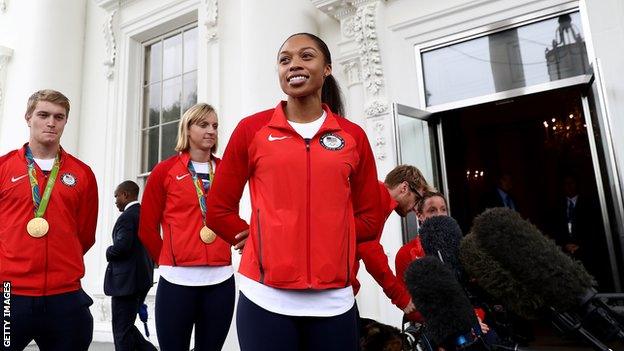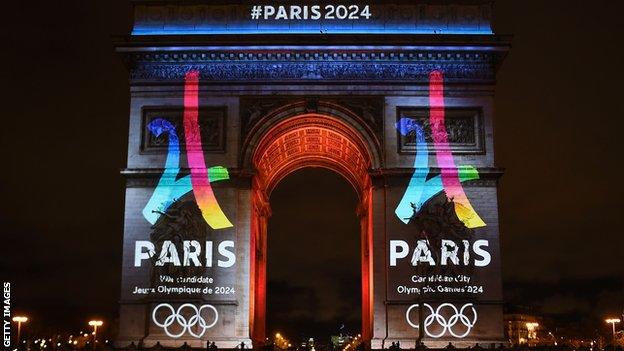Donald Trump: Election should not affect LA Olympic bid, says Allyson Felix
- Published

Allyson Felix, who won two gold medals at this year's Rio Olympics, was invited to the White House with other members of the USA team in September
Sprinter Allyson Felix urged Olympic officials to put aside questions over US president-elect Donald Trump when considering Los Angeles' 2024 bid.
Trump's election victory is being viewed as a setback to LA's hopes of hosting the Olympics because of his past comments about immigration.
Felix, part of LA's bid team, said there should be no "doubt" over the country's commitment to diversity.
And LA mayor Eric Garcetti said Trump would "absolutely not" affect the bid.
Six-time Olympic champion Felix said the US "needs the Games to help make our nation better - now more than ever".
She was speaking as part of the LA bid team's presentation to the Association of National Olympic Committees' general assembly in Doha.
LA's rivals from Budapest and Paris also made presentations to delegates.
"We just finished our presidential election and some of you may question America's commitment to its founding principles," said LA-born Felix, 30.
"I have one message for you: please don't doubt us. America's diversity is our greatest strength. Diversity is not easy. Diversity is a leap of faith that embraces all faiths.
"And that's why I believe LA is a perfect choice for the 2024 Games, because the face of our city reflects the face of the Olympic movement itself."
Trump, the Republican candidate for the White House, made some controversial pledges during campaigning.
The president-elect has said he would build a wall on the Mexican border, restrict abortion laws, overturn climate change agreements and "restrict" Muslims entering the US.
Mayor Garcetti told the BBC that Olympic bids "transcend national leadership always".
"We have been in touch with the [incoming] administration; they're excited to work with us," he added.
"What's most important for America is that we want an America that's engaged with the world. An America that turns to the world, not turns its back to the world."
The final decision on the 2024 host will be made in Peru next September.
What they said - bidding cities present their cases

The Paris 2024 bid logo is inspired by the Eiffel Tower and number 24
Los Angeles
"It's the most diverse city in human history and a place that will connect with the next generation," Garcetti told the BBC.
"When nobody else would bid in the midst of the Cold War, we were not only able to save the Olympic movement but also show how it could turn a profit," he added, referring to LA's hosting of the 1984 Games.
"For 20 to 30 years we put that money back into a legacy. Two sisters in the south part of Los Angeles, Serena and Venus Williams... turned into two of the best tennis players because we took the profits of those '84 games and put them into youth sports in communities that might not have had those opportunities."
"We think we can take it to the next level in 2024 and show the world how to connect with each other, with sports and also with opportunity."
Paris
"This is a bid led by athletes. We have people coming from the sport movement, many Olympians. We feel like we are in the right place," Paris bid leader Tony Estanguet told the BBC.
"This is the fourth bid from Paris, and we believe this bid is stronger. We already have 95% of existing venues, we already have the public transport in Paris, all the rooms in the hotels. That's why we think the cost will be very, very minimum."
"I don't like to know if we are the favourite or not, I know that I have to fight until the last minute."
Budapest
"If you ask me is Budapest an outsider, my answer is pretty clear - no way," bid leader Balazs Furjes told the BBC. "If you ask me if Budapest is different - definitely. In this race for 2024, Budapest is the real alternative.
"Beijing, London, Rio, Tokyo - who's next? Is the Olympics only for mega-cities - the richest and the biggest - or as it used to be? Remember Barcelona, Helsinki, Stockholm, Antwerp, Amsterdam - is it for mid-size cities too?
"A mid-size global city like Budapest can deliver a Games at reasonable scale and reasonable cost - and I think the Olympic movement needs that."
- Published9 November 2016